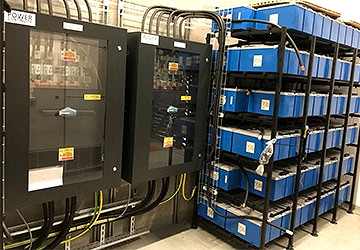Introduction: In the realm of reliable power supply, Uninterruptible Power Supply (UPS) batteries play a critical role in safeguarding electronic devices and systems from disruptions. This guide delves into the features, types, and considerations associated with UPS batteries, shedding light on their importance in ensuring uninterrupted and protected power.
Understanding UPS Batteries:
Essential Power Backup: Ups batteries are an integral component of Uninterruptible Power Supply systems. Their primary function is to provide a temporary power source during electrical outages, ensuring that connected devices receive a continuous and stable power supply.
Types of UPS Batteries:
Lead-Acid Batteries: Traditional lead-acid batteries are commonly used in UPS systems. They are cost-effective, reliable, and suitable for various applications. However, they may have a larger footprint and weight compared to newer technologies.
Lithium-Ion Batteries: Lithium-ion UPS batteries are gaining popularity due to their compact size, lighter weight, and longer lifespan. They offer higher energy density, allowing UPS systems to provide efficient power backup in a more compact form.
Key Features and Specifications:
Capacity (Ah): The capacity of a UPS battery, measured in ampere-hours (Ah), indicates the amount of energy it can store. Higher capacity batteries can provide longer backup times.
Voltage: UPS batteries are available in various voltage ratings. Common voltages include 12V, 24V, and 48V, depending on the UPS system's requirements.
Cycle Life: The cycle life represents the number of charge and discharge cycles a battery can undergo before its capacity significantly diminishes. It is a crucial factor in determining the battery's longevity.
Recharge Time: The recharge time is the duration required to replenish the battery's charge after a discharge. Shorter recharge times are advantageous for systems that need to be quickly restored to full capacity.
Applications of UPS Batteries:
Critical IT Infrastructure: UPS batteries are widely used in data centers, server rooms, and critical IT infrastructure to ensure continuous power during electrical interruptions, preventing data loss and equipment damage.
Healthcare Facilities: Hospitals and healthcare facilities rely on UPS batteries to support critical medical equipment, ensuring uninterrupted power for patient care, diagnostics, and life-saving devices.
Telecommunications: UPS batteries are essential in the telecommunications industry to maintain the operation of communication networks, towers, and equipment, especially in areas prone to power fluctuations.
Industrial Automation: Manufacturing and industrial facilities use UPS batteries to safeguard automated systems, control panels, and sensitive electronic equipment from power disruptions that could lead to production downtime.
Maintenance and Monitoring:
Regular Inspections: Periodic inspections of UPS batteries are crucial to identify signs of wear, leakage, or other issues. Routine maintenance, including cleaning and tightening connections, helps ensure optimal performance.
Battery Monitoring Systems: Advanced UPS systems often include battery monitoring systems that provide real-time information on the health and status of the batteries. These systems facilitate proactive maintenance and early detection of potential issues.
Environmental Considerations:
Temperature Control: UPS batteries perform optimally within a specified temperature range. Adequate ventilation and temperature control measures should be implemented to prevent overheating, which can affect battery life.
Disposal and Recycling: Proper disposal and recycling procedures should be followed at the end of a UPS battery's life cycle to minimize environmental impact. Many UPS battery manufacturers have recycling programs in place.
Future Trends:
Advancements in Battery Technology: Ongoing advancements in battery technology, including the development of new materials and chemistries, may lead to UPS batteries with improved energy density, longer life cycles, and enhanced performance.
Integration with Renewable Energy: UPS systems may increasingly integrate with renewable energy sources, such as solar or wind, to provide sustainable and resilient power solutions.
Conclusion: UPS batteries serve as the backbone of Uninterruptible Power Supply systems, ensuring a continuous and reliable power source in critical applications. Understanding the types, features, and maintenance considerations of UPS batteries is essential for optimizing their performance and contributing to the seamless operation of electronic devices and systems.Top of Form
For more info. Visit us:





Comments